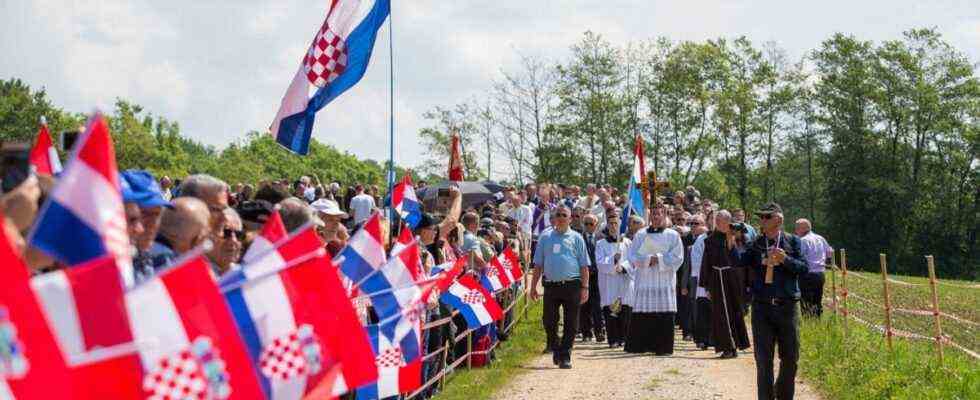The short message sounded banal, but it contains a lot of explosives: An expert committee convened by the Austrian Ministry of the Interior recommends, it is said, the ban “of the controversial annual Croatian meeting on the Loibacher Feld near Bleiburg in Carinthia”. On Wednesday, the government in Vienna decided on a corresponding initiative for the “Bleiburg Expert Report”, which will soon be voted on in the National Council. Parliamentary normality? Not at all.
It took decades – especially under pressure from the Greens – until a group of lawyers, historians, representatives of the Church, the police and politics put together a total of 110 pages and justified what should have happened a long time ago: Probably the largest meeting of fascists in Europe, which (apart from two corona-related exceptions) took place every year in May in Carinthia, it should no longer exist – at least not in the previous form.
Officially, the march is reminiscent of the “Bleiburg massacre”: In May 1945, members of the Yugoslav People’s Liberation Army killed an unknown number of fighters from the Croatian Ustaše militia, allied with the Nazi regime, as well as civilians who had fled from Tito’s partisans to what was then the British occupation but had been sent back by the British. Since the 1950s at the latest, the commemoration has increasingly mutated into a meeting that idealized the SS and the Nazi dictatorship, but above all the fallen soldiers of the fascist Croatian state, as resistance fighters. The Croatian war in the 1990s was also commemorated later.
Openly displayed were symbols, uniforms, flags and other relevant identifying features of the fascist Croatian state NDH, which existed from 1941 to 1945, but also of Croatian paramilitaries. A memorial stone on the private property, on which a “Stations of the Cross” declared as a “religious ceremony” ends, is still today dedicated to “Honor and Glory of the Fallen Croatian Army, May 1945”, ie the army of the NDH. For a long time, the regional authorities and the church did not see themselves in a position or willing to intervene; in fact, they probably avoided disputes with the organizers for reasons of opportunity. Regular reports of sedition were not followed up.
At least the inscription on the memorial stone must be removed
Everything should now be different. The group of experts comes to the conclusion that the celebration organized by the Bleiburger Ehrenzug at Loibacher Feld must not take place because it contradicts the obligations of the State Treaty of Vienna from 1955. In addition, the inscription on the memorial stone must be removed. The list of forbidden Ustaša symbols is expanded. The Greens celebrate the report and the decision as a turning point. Their spokeswoman for art, science, memorial policy and right-wing extremism, Eva Blimlinger, told the SZ that the options previously used by the organizers to circumvent existing laws would now be radically restricted. Unfortunately, those responsible in the Bleiburg district, as well as the Catholic Church, avoided consistent action for too long. It was only in recent years that the diocese of Gurk-Klagenfurt had clearly distanced itself from the march disguised as a church service, and the Croatian government, which had repeatedly sent high-ranking representatives and, most recently, its ambassador, was increasingly critical in recent years.
The experts themselves are a little skeptical, however, as to whether corresponding legal amendments are actually sufficient to take the right-wing extremists’ drive for their annual meeting. “Even if an event like the one that was held before 2020 should be forbidden in the future,” they say, it does not rule out “the fact that the dead will still be commemorated”. In principle, however, nothing can be said against a Catholic mass, since there are also “neutral commemorations” which are “not about the appreciation of fascist ideas”. The Carinthian governor Peter Kaiser (SPÖ) is also skeptical, demanding a “clear plan” to rule out the possibility that “a possible memory of the dead would also be misused in the future by some people to represent their disturbed transfiguration for a terror regime”. It would also be up to him to develop and implement such a plan with those responsible locally.
In their current podcast “Ballaballa Balkan” with the title “Bye, bye Bleiburg”, the journalists Krsto Lazarević and Danijel Majić state that the report lacks a specific call for action to the “chronically inactive authorities”. The revisionists and fascists had already played “cat and mouse” with those responsible.

